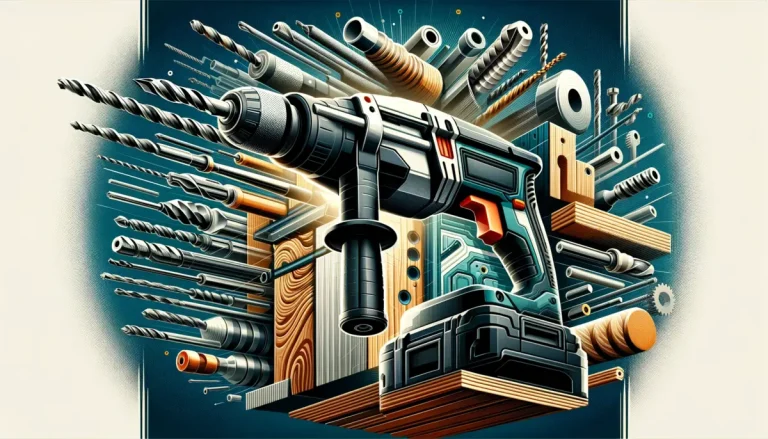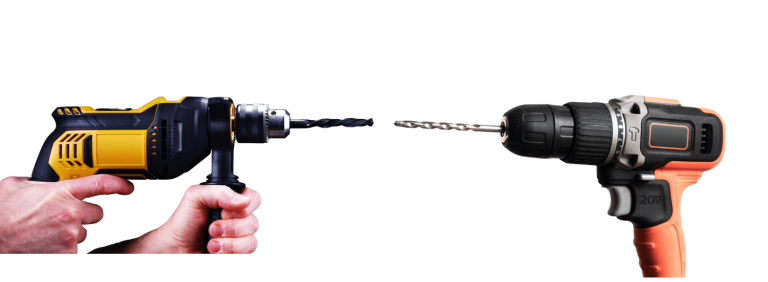Best Corded Hammer Drill 2024 (For Concrete or Demo Day)
Have you hit a wall—literally—on your DIY projects? Do you need to mount something to brick, or break up some unsightly concrete?
By now you know you’re going to need a hammer drill, but which one? If you’re looking for uninterrupted power, a corded model is where to start.
But how to choose? First, consider what features you need most. Then, take a look at our picks for the best corded hammer drill that checks all your boxes.
It’s as easy as that. Let’s get to it.
Factors to Consider When Choosing Your Corded Hammer Drill
When choosing a corded hammer drill, there are several key factors to keep in mind to ensure you get the right tool for your needs. Here are five important considerations:
- Power and Performance: Look at the wattage and the impact energy (measured in Joules) of the drill. Higher wattage and greater impact energy mean the drill can handle more demanding tasks with ease. You want a drill that can deliver the power you need for tough materials like concrete and masonry.
- Speed Settings and Control: Check if the drill offers variable speed settings, which allow you to adjust the speed based on the material you’re working with. This feature provides better control and efficiency, ensuring you don’t damage the material or the drill bit.
- Chuck Size and Type: The chuck size determines the size of the drill bit that can be used. A larger chuck size means you can use larger drill bits for bigger holes. Also, consider whether the drill has a keyed or keyless chuck; keyless chucks are more convenient for quick bit changes.
- Comfort and Ergonomics: Since you’ll be holding the drill for extended periods, it should feel comfortable in your hands. Look for features like a padded or soft-grip handle and an ergonomic design that reduces fatigue during use. The weight of the drill is also a factor in comfort, especially for prolonged use.
- Additional Features: Consider any extra features that might be useful for your projects, such as a built-in LED light for working in poorly lit areas, a depth stop for precise drilling, or a hammer-only function for chiseling tasks. These additional features can enhance versatility and ease of use.
By keeping these factors in mind, you can select the best one on the market that meets your specific needs and ensures efficient and effective performance for your projects.
Overall Winner – Best Corded Hammer Drill
Makita HR2475 1-Inch SDS Plus Rotary Hammer Drill
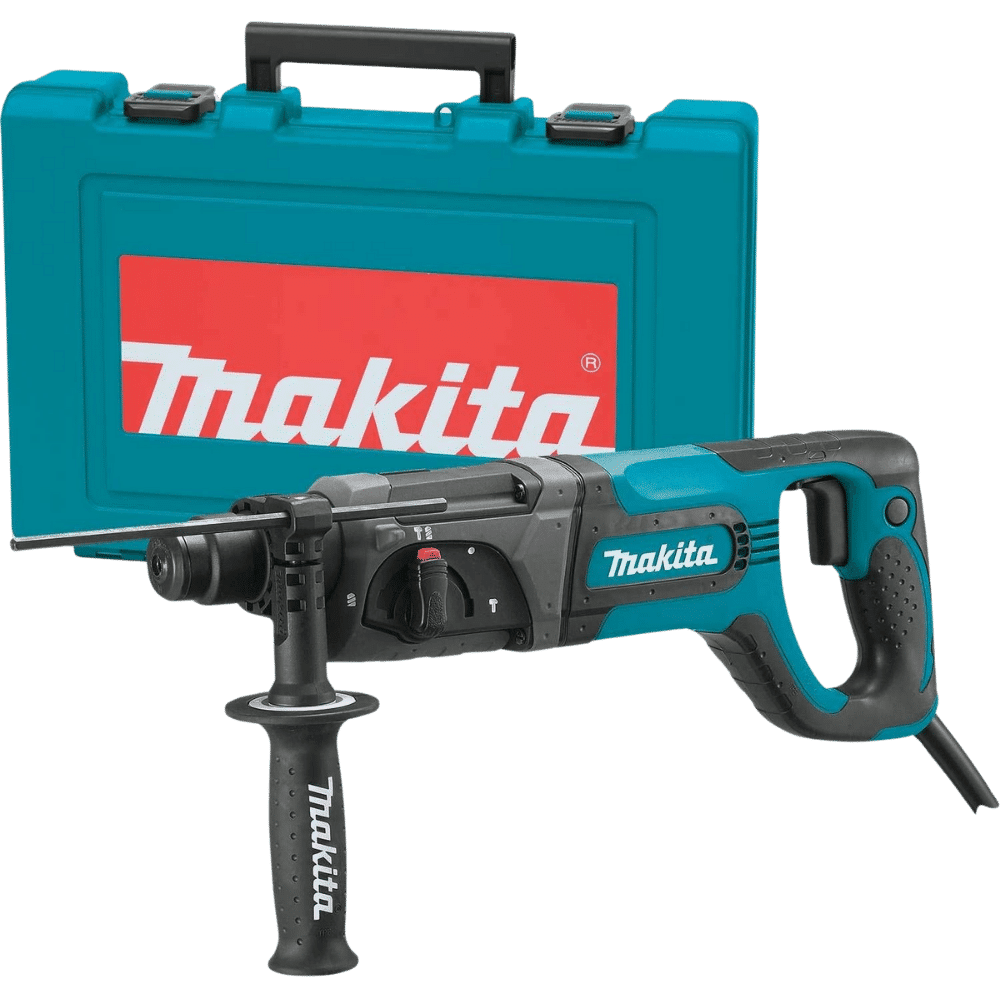
When I first grabbed this Makita, I immediately noticed its heft and balance. It feels solid and substantial, exactly what you want in a heavy duty tool. The 1-Inch Rotary Hammer is engineered for efficiency and durability, turning tough tasks into a walk in the park. Its ability to punch through concrete with precision and keep your work clean and professional is impressive.
The build quality of the HR2475 is what you’d expect from a well-known brand like Makita. But it’s not just about being tough; this drill is smart. With a D-handle design that feels like a natural extension of your arm and a vibration-absorbing handle that lets you work longer without fatigue, it’s clear this tool is designed with the user in mind.
Smart Features for the Smart DIYer
- Sequential Impact Timing: This feature delivers timed hammering during rotation to minimize overlapping bit impacts, resulting in up to 50% faster drilling. It’s like having an assistant who knows exactly when to swing the hammer.
- Torque Limiting Clutch: Say goodbye to the dreaded twist that comes with a bit snag. This clutch disengages the gears, preventing gear damage and offering peace of mind during high-torque situations.
- Variable Speed Control: The right speed can make all the difference. With this rotary hammer, you’re always in control, making your work not just faster but also more precise.
Pros:
- Powerful 7.0 AMP motor for efficient drilling
- Versatile 3-mode operation to tackle a range of tasks
- Ergonomic D-handle for comfortable use
- Quick bit changes with the SDS-PLUS shank
- Built-in torque limiting clutch to protect the gears
Cons:
- Weight: It’s a bit on the heavier side, which might be tiring for some users during extended use.
- Corded Limitation: Being corded means your range is limited to the length of your extension cord.
In my two decades of DIY adventures, I’ve learned that the right tool doesn’t just make a job possible; it makes it enjoyable. The Makita HR2475 has been a reliable companion, turning what used to be grueling tasks into something I look forward to. Whether it’s the seamless drilling experience, the thoughtful features, or the sheer reliability of this machine, it’s clear why it’s taken the top spot on my list.
Top Corded Hammer Drill for Concrete Removal
DEWALT D25263K 1-1/8-Inch SDS Rotary Hammer Drill
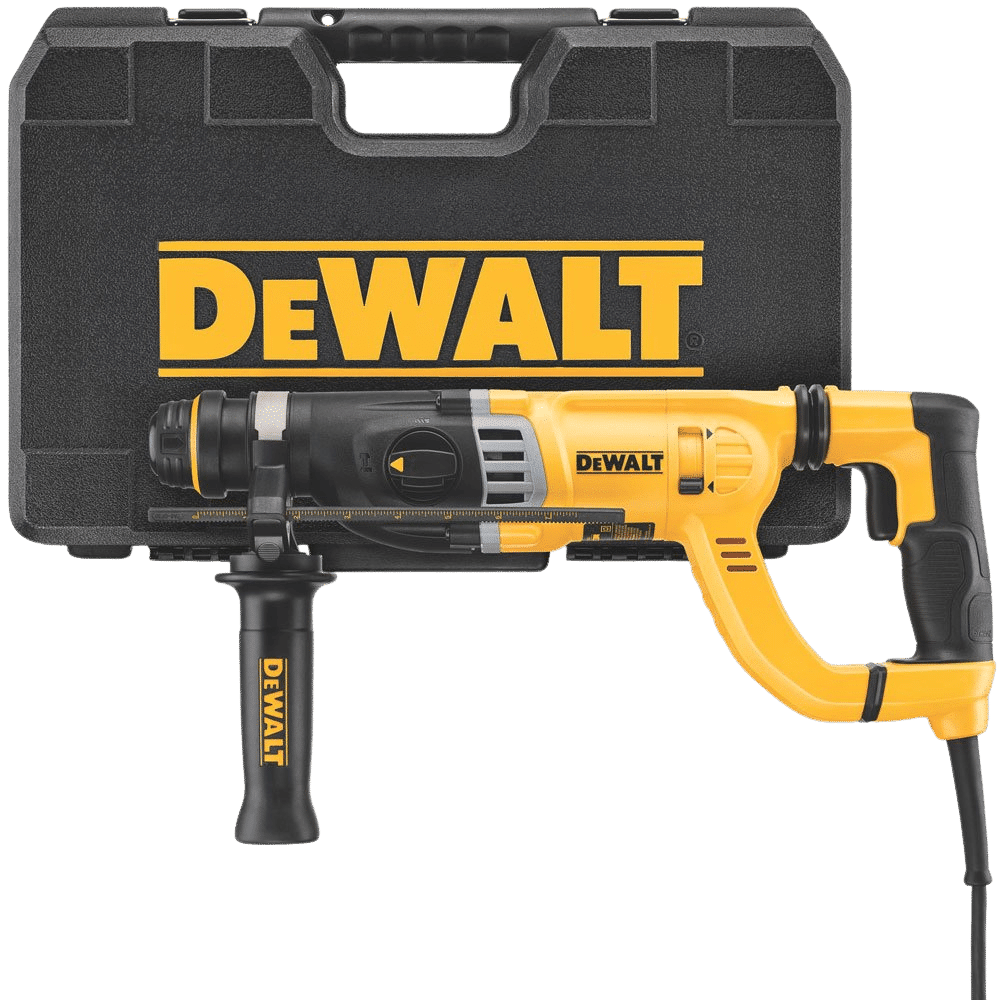
From the get-go, the DEWALT D25263K makes an impression with its robust 1-1/8-Inch chuck size, perfect for the heavy-duty bits needed to break through even the most stubborn concrete. The secret sauce? Its formidable 8.5-amp motor that delivers high-performance energy, ensuring that when you’re ready to work, so is your drill.
But power without precision is like a ship without a rudder—potentially disastrous. Luckily, this rotary hammer comes equipped with an active vibration control system that significantly reduces vibration, allowing for precise, controlled drilling and chiseling. It’s like having a steady hand guiding yours, ensuring accuracy with every hit. It also won’t leave you feeling tingly after a job.
Features That Shine
- Active Vibration Control: Reduces vibration felt by the user at the handles—a boon for those long demolition sessions.
- Rotating Brush Ring: Delivers full speed/torque in forward and reverse, making your job smoother and more efficient.
- Variable Speed Trigger: Allows for instant control from the word go, providing a tailored experience for each task.
Pros:
- Mighty Motor: Powers through concrete with ease, making tough jobs look easy.
- Comfort in Control: Vibration control and ergonomic design ensure comfort, reducing fatigue.
- Versatility at Its Best: Equipped for drilling, hammer drilling, and chiseling, it’s ready for whatever the job demands.
Cons:
- Weighty Wonder: Its robust build adds to its weight, which might not appeal to all users.
- Corded Constraints: The cord can limit mobility, something to consider for jobs with less access to power outlets.
The DEWALT D25263K, with its formidable power and user-centric features, took concrete removal from a chore into a challenge I was eager to tackle. The smooth handling, relentless power, and sheer satisfaction of breaking through barriers, this drill has earned my accolades as the go-to for concrete demolition.
Best Option on a Budget
SKIL 7.5-Amp 1/2-Inch Corded Hammer Drill – HD182001

First off, the 7.5-Amp motor in this compact powerhouse is nothing to scoff at. It’s capable of delivering the gusto needed for demanding tasks without the heart-stopping price tag. For the budget-conscious DIYer, this drill proves that you don’t need to empty your wallet for quality and power.
What stands out is its user-focused design. The drill is engineered with a comfortable grip and a lightweight build, making it a breeze to handle, even during extended use. It’s like SKIL knows the struggles of a day-long project and have crafted a tool that says, “I’ve got you.”
Features That Matter
- Variable Speed: With the precision speed control, you’re in charge, able to adjust to the task at hand, whether it’s delicate surface work or full-throttle drilling.
- Lock-on Button: A small but mighty feature that reduces fatigue, perfect for those longer drilling sessions where you just don’t want to let go.
- Hammer Function: For when you need that extra punch to break through tougher materials, this function turns challenges into child’s play.
Pros:
- Affordability: It’s hard to find such a reliable drill at this price point.
- Ease of Use: Lightweight and comfortable, it’s designed for long hauls without the strain.
- Versatile: Switch between drilling and hammer drilling with ease, making it suitable for a range of projects.
Cons:
- Power Limitations: While powerful for its price, it may not match the brute force of higher-end models for the most demanding tasks.
- Corded Design: The tether to an outlet can limit mobility, though it’s a common trade-off with corded reliability.
I can confidently say the SKIL 7.5-Amp drill strikes the perfect balance for those watching their budget. It’s a testament to the idea that great things can come in affordable packages, proving itself time and again as a reliable companion for a wide array of projects. Whether you’re assembling a dream deck or anchoring shelves for a weekend organization spree, this drill is the budget-friendly sidekick you’ve been searching for.
Best for Lightweight Maneuverability
RIDGID R5013 ½-Inch Hammer Drill
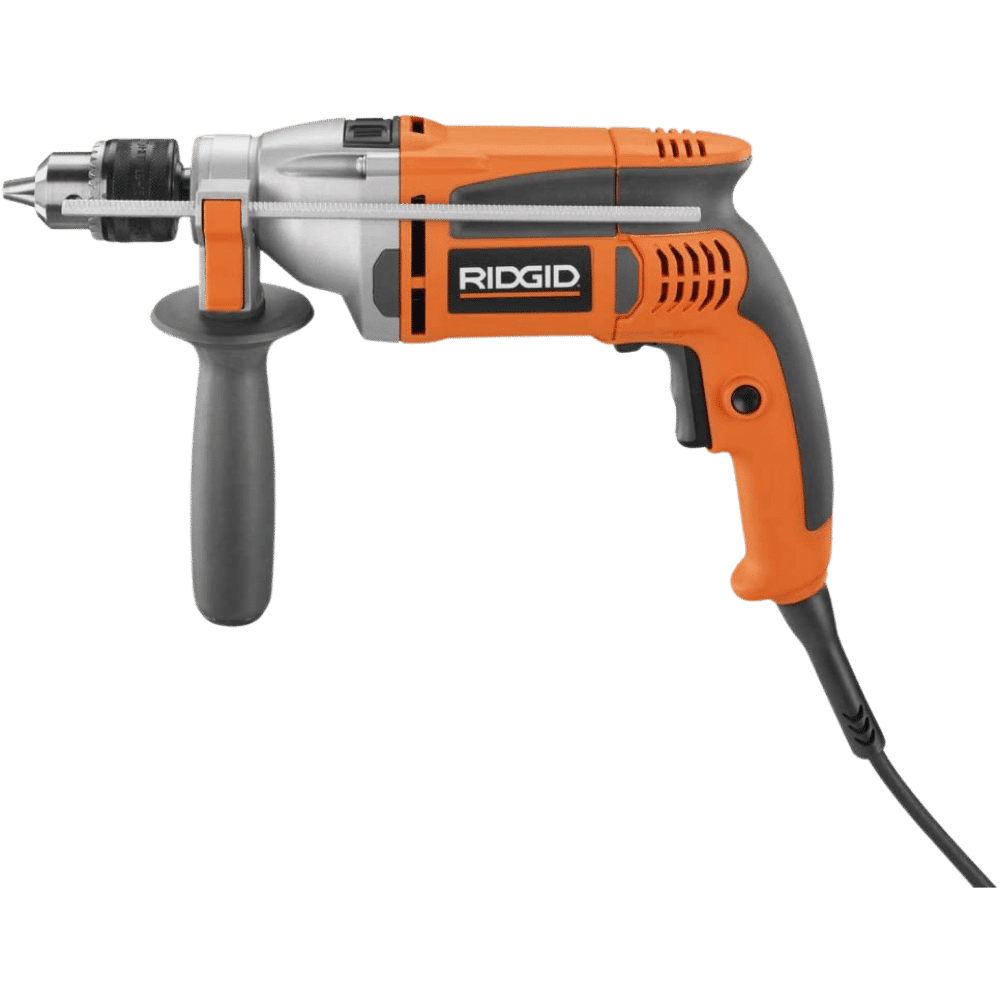
This RIDGID drill stands out because it’s both powerful and lightweight. It’s like having a magic wand that can easily go through very hard materials. This shows you don’t need a heavy drill to do big jobs.
The way this drill is made really shows it’s built for the user. It’s comfortable to hold and well-balanced, so you won’t get tired even after using it for a long time. It feels like the drill is just an extension of your hand, moving smoothly with you.
Key Features at a Glance
- Compact Design: Its sleek build allows for easy handling, especially in tight spaces where traditional drills dare not tread.
- Powerful Motor: Don’t let the size fool you; the motor packs a punch, making light work of heavy-duty tasks.
- Variable Speeds: Adaptability is key, and with variable speed settings, you’re always in control, able to match the tool’s pace with the task at hand.
Pros:
- Lightweight: Ideal for prolonged use without the strain.
- User-Friendly: Intuitive design and comfortable grip make it a pleasure to use.
- Versatile: Equally adept at delicate surface work as it is at power drilling.
Cons:
- Corded Limitations: While it offers consistent power, being corded might restrict movement in larger or more awkward spaces.
- Noise Level: It can be a bit louder than some of its counterparts, something to consider if noise is a concern.
In my view, the RIDGID R5013 is not just any tool; it really shows how much better power tools have gotten. This drill works really well and smoothly, even though it’s strong and tough. Whether you’re working in small, tight spaces like fitting new kitchen cabinets, or drilling above your head for a long time, this drill is reliable and easy to use. It shows that for DIY projects, a lighter tool can still be very powerful.
Best for Concrete or Masonry
BOSCH GBH2-28L 1-1/8-Inch SDS-plus Variable-speed Bulldog Xtreme Max Rotary Hammer

The first thing you’ll notice is the sheer power this Bosch rotary hammer brings to the table. It’s like holding a thunderbolt that chisels through concrete with astonishing ease. The variable-speed feature is a game-changer, allowing you to tailor the speed to the task, ensuring precision with every hole.
But power isn’t all it offers. The robust design is matched by intelligent features that protect both the tool and the user. The KickBack Control reduces the risk of sudden tool reactions, while the Vibration Control ensures you can work longer without discomfort. It’s as if the drill is looking out for you, making your safety a priority.
Features That Make a Difference
- KickBack Control: Adds a layer of safety by minimizing sudden tool rotations.
- Vibration Control: Keeps the shakes at bay, allowing for smoother operation.
- Variable Speed: Offers control and versatility for a range of materials and tasks.
Pros:
- Mighty Power: Tackles concrete and masonry without breaking a sweat.
- User Safety: Advanced features like KickBack Control make it safer to use.
- Comfortable Use: Designed to reduce fatigue with Vibration Control.
Cons:
- Weight: Its sturdy build adds a bit of heft, which might be noticeable on longer jobs.
- Price Point: Quality comes at a price, making it an investment for serious DIYers.
The BOSCH GBH2-28L stands out not just for its ability to dominate concrete and masonry, but for how it makes the task feel like a craft. It’s the kind of tool that doesn’t just perform; it gives you confidence, making you feel ready to take on any project, no matter how tough.
Best for Heavy-Duty Jobs
ENEACRO 1-1/4 Inch SDS-Plus Heavy Duty Rotary Hammer
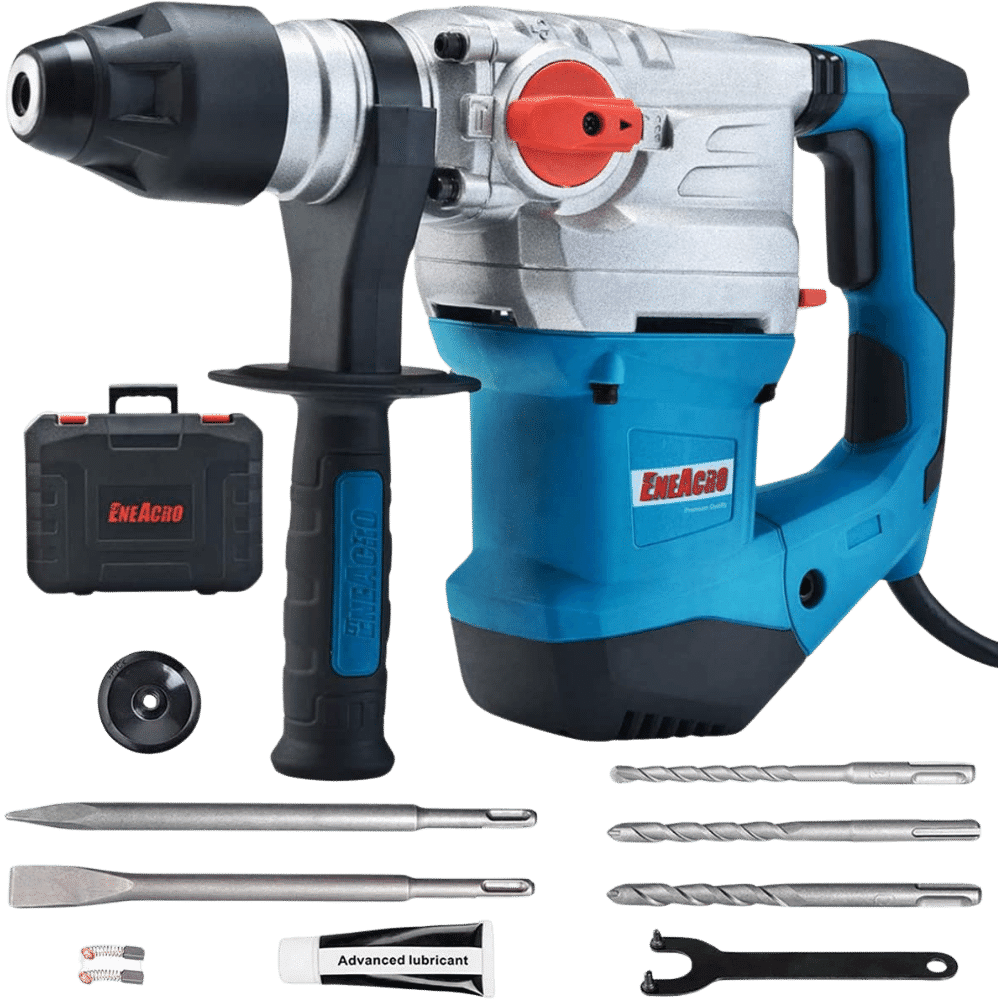
At the heart of this beast lies a motor that seems to defy the laws of physics. With the raw power it packs, you’d think it would be a behemoth, but it’s surprisingly manageable. It’s like having a sledgehammer that feels as easy to swing as a regular hammer.
But power without control is like a wild horse—impressive, yet hard to harness. That’s where the ENEACRO shines. Its precision control makes it feel like you’re conducting an orchestra of force, with every note hitting just right.
Built For the Long Haul
- Anti-Vibration System: Say goodbye to the days of jarring vibrations. This system keeps things steady, reducing strain on your hands and arms.
- Three Modes of Operation: Whether it’s drilling, hammer drilling, or chiseling, this tool has a setting that’s perfect for the job at hand.
- Safety Features: With an integrated clutch to reduce sudden torque reactions, it’s like having a built-in safety net for those just-in-case moments.
Pros:
- Mighty Power: It laughs in the face of dense materials and stubborn demolitions.
- User-Friendly Design: Despite its strength, it’s designed for ease of use and comfort.
- Durability: Built to last, it’s a long-term investment for any serious DIYer.
Cons:
- Heft: While it’s not unwieldy, its robust build adds a bit of weight.
- Noise Level: With great power comes great… noise. It’s a bit loud, but that’s to be expected with such force.
From personal experience, the ENEACRO Rotary Hammer is more than a tool; it makes a statement that no project is too big, no task too difficult. It’s the kind of tool that, once you’ve used it, makes you wonder how you ever managed without it. Whether you’re demolishing an old wall or powering through layers of concrete, this drill stands as a testament to what heavy-duty truly means.
FAQs
What is a corded hammer drill used for?
A corded electric hammer drill is primarily used for drilling into hard materials like concrete, brick, and masonry, combining rotation with a hammering action to penetrate tough surfaces.
Can a corded hammer drill be used for regular drilling tasks?
Yes, most corded hammer drills come with a setting that allows you to switch off the hammering action, making them suitable for regular drilling tasks in materials like wood and metal.
How does a corded hammer drill differ from a cordless one?
A corded hammer drill relies on a constant power supply from an electrical outlet, offering sustained power and torque for longer periods, while a cordless hammer drill provides portability and convenience at the cost of battery life and sometimes power.
What should I look for when buying a corded hammer drill?
Key factors include power (measured in amps), speed settings, the type of chuck (SDS or keyless), weight, ergonomic design, and additional features like anti-vibration technology and variable speed controls.
What does SDS mean in a hammer drill?
SDS stands for Slotted Drive System, a type of chuck that provides a stronger grip on the drill bit, specifically designed for high-impact hammer drilling, making bit changes quicker and improving the drill’s performance in heavy-duty tasks.
Can corded hammer drills be used to chisel or break concrete?
Yes, many hammer drills, especially those with an SDS chuck, offer a “rotary stop” or “chisel only” mode that allows the tool to be used as a light-duty chisel for breaking concrete or tile.
How do I maintain my corded hammer drill?
Maintenance tips include regularly checking and tightening the chuck, cleaning vents and the tool’s exterior, lubricating moving parts as specified by the manufacturer, and storing the drill in a dry, dust-free environment.
Are there any safety precautions I should take when using a corded electric hammer drill?
Safety precautions include wearing protective gear (safety glasses, gloves, ear protection), ensuring the drill bit is securely fastened, using the correct drill bit for the material, keeping the cord away from the drilling area, and being mindful of electrical wiring and plumbing hidden in walls.
What is the difference between hammer drills and rotary hammers?
Hammer drills are suited for light to medium masonry work, combining rotation with a hammering action. Rotary hammers are a more powerful tool with a dedicated hammering action (without rotation) for heavy-duty drilling and chiseling in concrete and other hard materials.
Can I use a hammer drill to mix concrete or paint?
Yes, with the right attachment (like a mixing paddle), a hammer drill can be used on a low speed setting to mix materials like paint, thinset, or small batches of concrete, although it’s not the primary use of the tool.
Final Thoughts
Finding the best corded hammer drill for your DIY projects can be a game-changer. Whether you need to conquer concrete, tackle masonry, or simply enjoy the versatility of a powerful tool, our roundup has you covered.
Each drill on our list offers unique features and benefits to cater to your specific needs. From the mighty ENEACRO for heavy-duty tasks to the budget-friendly SKIL for those starting out, there’s a corded hammer drill for everyone.
Don’t miss out on the opportunity to elevate your DIY game. Click the links above to explore the details of these fantastic choices and order the corded hammer drill that suits your projects best. Your next DIY triumph awaits – get started today!




